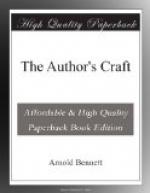And to his son he was very explicit about the extent to which unpopularity “mattered”: “As I am unpopular I am ill-paid, and therefore bound to work double tides, hardly ever able to lay down the pen. This affects my weakened stomach, and so the round of the vicious circle is looped.” (Vol. I., p. 322.) And in another letter to Arthur Meredith about the same time he sums up his career thus: “As for me, I have failed, and I find little to make the end undesirable.” (Vol. I., p. 318.) This letter is dated June 23rd, 1881. Meredith was then fifty-three years of age. He had written Modern Love, The Shaving of Shagpat, The Ordeal of Richard Feverel, Rhoda Fleming, The Egoist and other masterpieces. He knew that he had done his best and that his best was very fine. It would be difficult to credit that he did not privately deem himself one of the masters of English literature and destined to what we call immortality. He had the enthusiastic appreciation of some of the finest minds of the epoch. And yet, “As for me, I have failed, and I find little to make the end undesirable.” But he had not failed in his industry, nor in the quality of his work, nor in achieving self-respect and the respect of his friends. He had failed only in one thing—immediate popularity.
II
Assuming then that an author is justified in desiring immediate popularity, instead of being content with poverty and the unheard plaudits of posterity, another point presents itself. Ought he to limit himself to a mere desire for popularity, or ought he actually to do something, or to refrain from doing something, to the special end of obtaining popularity? Ought he to say: “I shall write exactly what and how I like, without any regard for the public; I shall consider nothing but my own individuality and powers; I shall be guided solely by my own personal conception of what the public ought to like”? Or ought he to say: “Let me examine this public, and let me see whether some compromise between us is not possible”?




